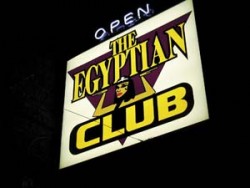Egyptian Club
Egyptian Club is a term that may refer to a variety of organizations, associations, or clubs in Egypt or related to Egyptian culture, history, or expatriate communities around the world. Given the broad nature of the term, this article will focus on the general concept of Egyptian clubs, their purposes, and their roles within society. Egyptian clubs can range from social and cultural associations to sports clubs and professional networks, each serving different aspects of community life and interests.
Overview[edit | edit source]
Egyptian clubs often serve as a hub for individuals sharing a common interest, whether that be in sports, cultural activities, professional networking, or social services. These clubs can be found both within Egypt and in countries with significant Egyptian expatriate communities. They play a crucial role in preserving Egyptian culture, providing social support networks, and promoting activities that reflect the interests and heritage of their members.
Types of Egyptian Clubs[edit | edit source]
Cultural and Social Clubs[edit | edit source]
Cultural and social clubs are pivotal in fostering a sense of community among Egyptians and those interested in Egyptian culture. They organize events, workshops, and gatherings that celebrate Egyptian traditions, festivals, and holidays. These clubs often serve as important venues for cultural exchange and education, helping to maintain the cultural identity of the Egyptian diaspora.
Sports Clubs[edit | edit source]
Sports clubs in Egypt are among the most popular and influential clubs in the country. Clubs like Al Ahly SC and Zamalek SC are not only famous for their achievements in football but also play significant roles in Egyptian society. These clubs offer facilities for a variety of sports and activities, contributing to the physical well-being and sports culture in Egypt.
Professional and Academic Clubs[edit | edit source]
Professional and academic clubs provide a platform for networking, career development, and academic collaboration. These clubs can be found within various sectors, including medicine, engineering, and business. They organize conferences, seminars, and workshops that facilitate professional growth and innovation.
Role in Society[edit | edit source]
Egyptian clubs play a multifaceted role in society. They are not only centers for leisure and recreation but also act as important social institutions that contribute to the cultural, educational, and economic life of the community. Through their activities, these clubs promote social cohesion, cultural preservation, and professional development among their members.
Challenges[edit | edit source]
Despite their importance, Egyptian clubs face several challenges, including financial sustainability, modernization, and adapting to the changing needs of their members. Ensuring accessibility and inclusivity while maintaining traditions and meeting the diverse interests of their communities are ongoing challenges for many clubs.
Conclusion[edit | edit source]
Egyptian clubs, with their rich variety and deep-rooted presence in society, continue to play a vital role in promoting culture, sports, and professional networking both within Egypt and abroad. They embody the spirit of community and shared identity, making significant contributions to the social fabric of Egyptian life.
Search WikiMD
Ad.Tired of being Overweight? Try W8MD's physician weight loss program.
Semaglutide (Ozempic / Wegovy and Tirzepatide (Mounjaro / Zepbound) available.
Advertise on WikiMD
|
WikiMD's Wellness Encyclopedia |
| Let Food Be Thy Medicine Medicine Thy Food - Hippocrates |
Translate this page: - East Asian
中文,
日本,
한국어,
South Asian
हिन्दी,
தமிழ்,
తెలుగు,
Urdu,
ಕನ್ನಡ,
Southeast Asian
Indonesian,
Vietnamese,
Thai,
မြန်မာဘာသာ,
বাংলা
European
español,
Deutsch,
français,
Greek,
português do Brasil,
polski,
română,
русский,
Nederlands,
norsk,
svenska,
suomi,
Italian
Middle Eastern & African
عربى,
Turkish,
Persian,
Hebrew,
Afrikaans,
isiZulu,
Kiswahili,
Other
Bulgarian,
Hungarian,
Czech,
Swedish,
മലയാളം,
मराठी,
ਪੰਜਾਬੀ,
ગુજરાતી,
Portuguese,
Ukrainian
Medical Disclaimer: WikiMD is not a substitute for professional medical advice. The information on WikiMD is provided as an information resource only, may be incorrect, outdated or misleading, and is not to be used or relied on for any diagnostic or treatment purposes. Please consult your health care provider before making any healthcare decisions or for guidance about a specific medical condition. WikiMD expressly disclaims responsibility, and shall have no liability, for any damages, loss, injury, or liability whatsoever suffered as a result of your reliance on the information contained in this site. By visiting this site you agree to the foregoing terms and conditions, which may from time to time be changed or supplemented by WikiMD. If you do not agree to the foregoing terms and conditions, you should not enter or use this site. See full disclaimer.
Credits:Most images are courtesy of Wikimedia commons, and templates Wikipedia, licensed under CC BY SA or similar.
Contributors: Prab R. Tumpati, MD

